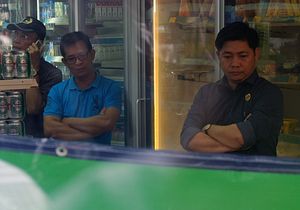Well-known Cambodian independent analyst Kem Ley was shot dead in broad daylight on Sunday morning with two bullets from a Glock at a Caltex petrol station in Phnom Penh, where he stopped as part of his regular morning routine that included coffee and newspapers.
His death followed a months-long crackdown on dissenting voices that gained world-wide headlines with the bashings of two opposition politicians in October and last week’s Global Witness report which valued this country’s first family at a bare minimum $200 million.
Incidentally, he was killed just meters from the house of the prime minister’s nephew Hun To, who featured prominently in the Global Witness report and denies allegations linking him to a $1 billion heroin and money laundering ring in Australia.
Street protests erupted almost immediately afterwards as the body was ferried through the capital to a wat. Thousands jeered the police and observers said people were very angry and mindful of the slain environmentalist Chhut Vuthy and the murdered unionist Chea Vichea.
The killings of both men, shot dead in 2004 and 2012 respectively, has served as a lightning rod for the opposition Cambodian National Rescue Party (CNRP) who blamed the ruling Cambodian People’s Party (CPP) for their deaths.
Kem Ley’s name will be added to that list. Police here insisted he was killed in a dispute involving money. $3,000 was one touted figure, but few if anyone believed it.
Those close to Kem Ley said he had no major debts that they were aware of. The fact that he was shot from behind – once to the head and the other to the back — indicated a level of professionalism not normally associated with street thugs and debt collectors.
“This was a textbook hit,” an observer, who declined to be named, said.
Similar excuses were also put forward in the aftermath of previous political killings in what has become standard fare for a constabulary that seems intent on dragging its feet on investigations that might upset the politically connected.
Innocent people have also been offered up as scapegoats, as was the case with Chea Vichea.
If the intent was to silence opposition, it appears to be working, at least for the time being. People who normally speak on the record with journalists are now talking off the record only or refraining from speaking at all.
However, Global Witness strongly condemned the killing of Kem Ley, which came just three days after its report lifted the lid on an intricate network of companies that control most of the Cambodian economy.
“We are calling for a thorough and independent investigation into Ley’s murder that will ensure that the real perpetrators are brought to justice, not just the hitmen,” the London-based anti-corruption campaigner said.
“Cambodia has a long history of political, human rights and labor activists being killed, with murderers rarely brought to justice.
“We are also calling on Cambodia’s international aid partners to condemn this killing in the strongest terms, and to support the call for an independent investigation.”
The report, Hostile Takeover, found the Hun Sen family held interests in 114 companies including mining, agriculture, electricity, media, garment, forestry and transport. Their business ties include Apple, Visa, Procter & Gamble, Tommy Hilfiger and Polo Ralph Lauren.
Hostile Takeover did not include the value of the family’s land assets, which observers said would substantially add to the family’s worth.
“This is undoubtedly just a fraction of the true value of the family’s business holdings,” it said.
It’s a sensitive issue. The report found it was often said the family had a history of hiding its wealth through proxies and observes added the family fears its fabulous wealth will alienate it further from voters who returned the CPP at the last election but with a substantially reduced majority.
Sources said Hun Sen’s children, including Hun Mana, the family’s most successful business person, complained bitterly about the report. Their supporters used social media and Nazi-era cartoons to attack local English language newspapers who covered the report.
The report was ignored by the Khmer media.
Luke Hunt can be followed Twitter @lukeanthonyhunt

































